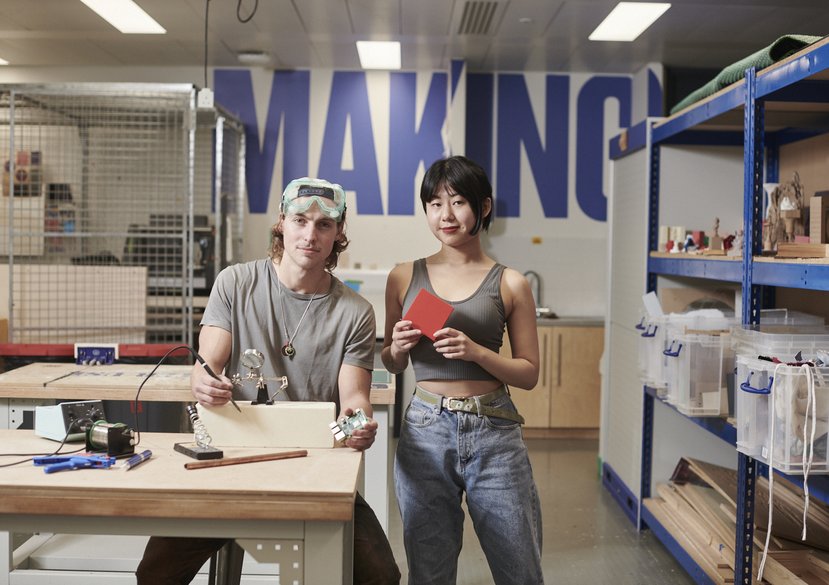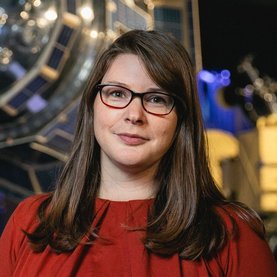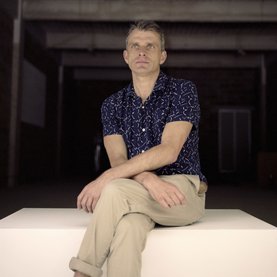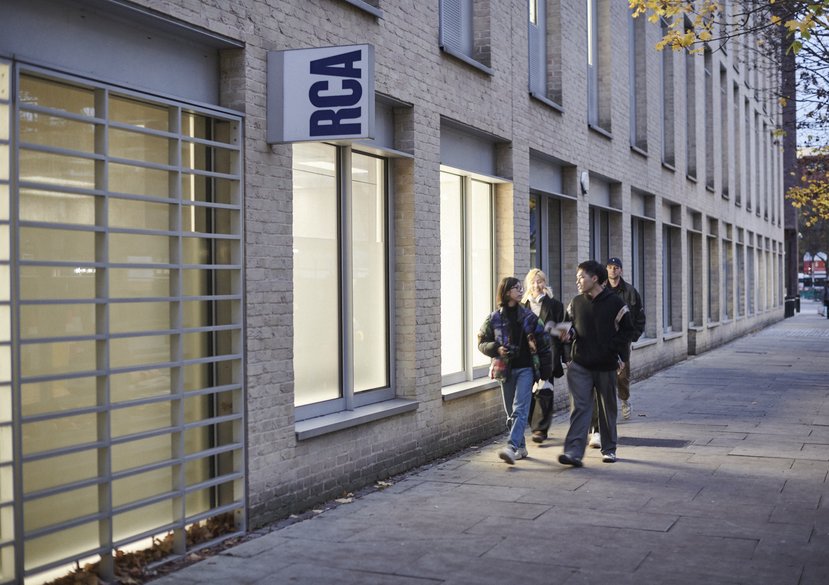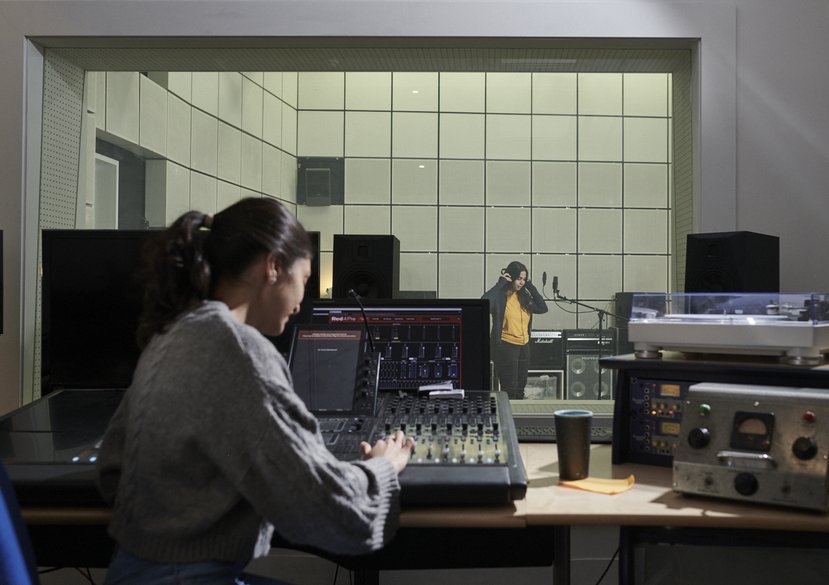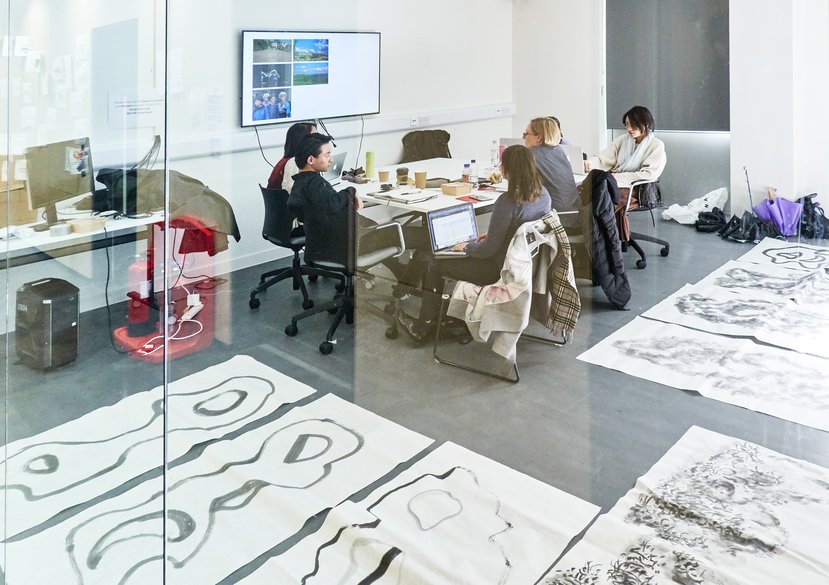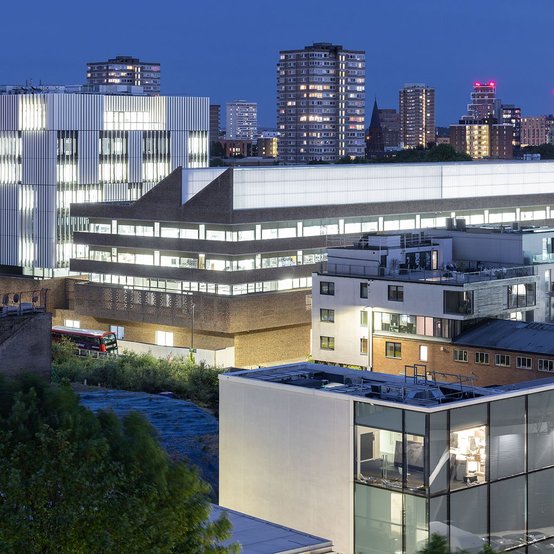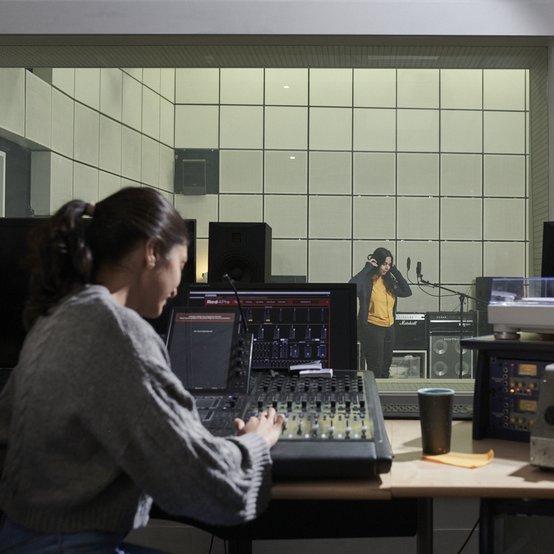
Overview
Transform and redefine your practice, push boundaries
Key details
- 180 credits
- 1 (PT) / 2 (PT) week programme
- Full-time or part-time study
School or Centre
Current location
- White City
Next open event
- 6 May 2025
- Join next Online Q&A Week
Round 2 application deadline
- 30 Jun 2025
Develop new ways of experiencing, interacting and communicating
- Transform and redefine your professional communication practice
- Construct a bespoke interdisciplinary program by choosing from electives provided by each of the RCA’s four Schools
- Become part of an international interdisciplinary community
- Fit study around your career with our part-time option
How does communication influence the way we interact with the world around us? To answer this question, you will be encouraged to draw inspiration from a range of different methods and methodologies designed to deepen your critical reflection and augment your creative approach as you transform and redefine your professional communication practice. Interdisciplinarity is put into action in a programme that combines theory and practice, while engaging in playful experimentation.
We make space for conversation, intercultural exchange, new ideas and diverse voices. RCA MFA Communication students have established professional practices from a broad range of backgrounds and specialisms both within and beyond the creative arts.
Decide your direction
The RCA MFA Communication combines the choice of college wide electives with the structure of focused core units, so every student has a unique journey. You’ll be able to combine electives that reflect your particular interests, drawing on both theory and practice as you consider the social, political, environmental and philosophical implications of contemporary communication and how these might be used to transform your practice.
Your final MFA Communication research project allows you to bring together your transformed approach as you design, produce and promote a project that re-defines the direction you want to take. Students work with anything from digital media, to food, fashion to film, painting to installation as they push boundaries and redefine not just their own practice but the very idea of what a practice can be.
The Communication MFA can be studied as a full-time or a part-time programme.
Catch the replays from our latest online Open Day.
Gallery
Staff
Facilities
The RCA has facilities at Kensington, Battersea and White City. MFA students will also benefit from being supervised by world-leading academics at the forefront of arts and humanities research and practice .
View all College-wide facilitiesYou will also have access to College-wide workshops on an individually planned and negotiated basis. Please note, this programme isn’t for those who want to try out a range of bespoke technical resources.
What you'll study
Flexibility and choice are at the heart of the offer, with a combination of Core and Elective units enabling you to create a bespoke programme of studies that best suits your approach, context and interests.
What you'll cover
How you'll learn
The MFA Communication programme will be delivered using on-campus and online delivery. Burst teaching takes place on campus, and provides you with opportunities to form a community of peers and develop a sense of belonging at RCA.
The programme's core units will be mainly delivered on campus, with some electives available online. Online resources will further contribute to your learning.
Programme structure (full time)
Term 1
In the first term, you take two core units.
Communication and Interdisciplinarity (15 credits) is structured around a series of activities designed to orient students on the programme and within the broad discipline of communication, with a particular focus on methods and approaches to interdisciplinary and transdisciplinary working. Recognising that students come from very different backgrounds, this unit will establish students’ position within a multidisciplinary community that will benefit their practice.
Cultures and Contexts (15 credits) challenges you to consider how skills and approaches in your own discipline may be applied in new contexts. You will be asked to reflect upon how your own skills are transferable, how your work can be informed by ideas and approaches in other disciplines, and what new professional opportunities exist for your practice within the expanding field of Communication.
You also take two 15-credit elective units, from across any of the RCA School. These may be delivered at another location or online. You are encouraged to choose electives from across the Schools of Architecture, Arts & Humanities, Design, or the Academic Development Office.
Term 2
In the first term, you take two core units.
Interventions (15 credits). This unit is centred around a group cross-disciplinary project to take place in the context of the UN Sustainable Development Goals.
Consolidating your Practice (15 credits). This unit supports you to consolidate your learning across the programme, including the core and elective units, in preparation for the Independent Research Project.
You also take two further 15-credit elective units, from across any of the RCA School.
Term 3
The Independent Research Project (60-credits) is an opportunity for you to develop and realise a body of work that addresses the key ambitions of your research and practice. You will draw on what you have learnt on the programme to devise a project which might be individual or collaborative. You will also be prepared to identify opportunities for the professional or public dissemination of your work, and to exploit your project for career progression in the communication sector. The nature of these opportunities will be specific to the individual and the nature of the practice that you choose to undertake during the unit. Your project will be supported by an allocated tutor.
During the unit you will be required to consider how your work will reach your audience. The College will provide you with an opportunity to co-curate an event or exhibition, working collaboratively with your peers. You may choose to take part in this event or may, alternatively, choose to explore other ways to exhibit or disseminate your work, for example, you may wish to take advantage of your own professional networks to reach a public audience in an external forum, managed independently of the College, particularly where your Independent Research Project was produced with or for an employer. This may be an event, or a digital or physical publication. Participation in an event is not mandatory, but an individual reflection of your plans for public output will form part of assessment for the unit.
The RCA MFA is a Level 7 UK qualification. Please ensure you read the curriculum carefully as the level and content of an MFA qualification does vary. The RCA MFA does not include formal training to teach.
This programme is delivered over 45 weeks (full time)
Programme structure (part-time)
Term 1
In the first term, you take two core units.
Communication and Interdisciplinarity (15 credits) is structured around a series of activities designed to orient students on the programme and within the broad discipline of communication, with a particular focus on methods and approaches to interdisciplinary and transdisciplinary working. Recognising that students come from very different backgrounds, this unit will establish students’ position within a multidisciplinary community that will benefit their practice.
Cultures and Contexts (15 credits) challenges you to consider how skills and approaches in your own discipline may be applied in new contexts. You will be asked to reflect upon how your own skills are transferable, how your work can be informed by ideas and approaches in other disciplines, and what new professional opportunities exist for your practice within the expanding field of Communication.
Term 2
You take Interventions (15 credits). This unit is centred around a group cross-disciplinary project to take place in the context of the UN Sustainable Development Goals.
You also take a 15-credit elective unit, from across any of the RCA School. These may be delivered at another location or online. You are encouraged to choose electives from across the Schools of Architecture, Arts & Humanities, Design, or the Academic Development Office. The elective handbook contains more information about the electives available and the process of selection.
Term 3
You take Industry Embedded Project (15 credits). Supported by tutors, you undertake an industry-based project, identified by yourself as of sufficient size to be equivalent to 15 credits (150 hours) and meeting unit Learning Outcomes.
You also take Entrepreneurship (15 credits), co-delivered with the School of Design. This unit examines the business, management, enterprise and entrepreneurial skills required to transform an innovative design or communication concept into a compelling value proposition. Students will choose to pitch to InnovationRCA or to external organisations.
Terms 4, 5 & 6
Independent Research Project (60 credits)
The Independent Research Project is an opportunity for students to propose and realise a body of work that addresses the key ambitions of your research and practice. You will draw on what you have learnt on the programme to devise a project which might be individual or collaborative. You will also be supported to identify opportunities for the professional or public dissemination of your work, and to exploit your project for career progression in the communication sector. The nature of these opportunities will be specific to the individual and the nature of the practice that you choose to undertake during the unit.
For part-time students, the project will be separated into three phases (Term 1: Proposal (15 credits), Term 5: Development (15 credits), and Term 6 : Realisation (30 credits), that take place in 3 units across one academic year. Your project will be supported by an allocated tutor. During the unit you will be required to consider how your work will reach your audience. The College will provide you with an opportunity to co-curate an event or exhibition, working collaboratively with your peers. You may choose to take part in this event or may, alternatively, choose to explore other ways to exhibit or disseminate your work, for example, you may wish to take advantage of your own professional networks to reach a public audience in an external forum, managed independently of the College, particularly where your Research Project was produced with or for an employer. This may be an event, or a digital or physical publication. Participation in an event is not mandatory, but an individual reflection of your plans for public output will form part of assessment for the unit.
In terms 4 and 5 you will take electives from any School across RCA, in the Schools of Architecture, Arts and Humanities, Communication, Design, or the Academic Development Office. These may be delivered at another campus location or online.
The RCA MFA is a Level 7 UK qualification. Please ensure you read the curriculum carefully as the level and content of an MFA qualification does vary. The RCA MFA does not include formal training to teach.
This programme is delivered over 90 weeks (part time)
College-wide Electives
Terms 1 & 4
Health and Care: Poetics of Care: to welcome, to love, to recover (15 credits, School of Arts & Humanities)
Sites and Situations – Spatial Feelings (15 credits, School of Arts & Humanities)
Art & the Urban (15 credits, School of Arts & Humanities)
Material Engagements (15 credits, School of Arts & Humanities)
Performing Practice (15 credits, School of Arts & Humanities)
Synthetic Encounters - Shapeshifting the Digital (15 credits, School of Arts & Humanities)
Housing and Social Reproduction (15 credits, School of Architecture)
Mobility and Debility (15 credits, School of Architecture)
Digital Storytelling (15 credits, School of Communication)
Design Ethics: Design for Good Practice (15 credits, School of Communication/School of Design)
Design Innovation: Models and Life Cycle (15 credits, School of Design)
Design Resilience: Future Forecasting (15 credits, School of Design)
Education for Change (15 credits, MEd Creative Education)
Term 2 & 5
Curatorial Practices: Curatorial Approaches (15 credits, School of Arts & Humanities)
Synthetic Encounters - Radical Matter: Coded Skins, Sticky Cohesions, Wild Science (15 credits, School of Arts & Humanities)
The Workshop (15 credits, School of Arts & Humanities)
Milieu Milieu Me (The Ecology) (15 credits, School of Architecture)
Capital’s Shadow (15 credits, School of Architecture)
Worldbuilding (15 credits, School of Communication)
Interventions (15 credits, School of Communication)
Design Ethics: Design for Responsible Behaviour (15 credits, School of Communication/School of Design)
Design Innovation: Venture Creation (15 credits, School of Design)
Design Resilience: Sustainability (15 credits, School of Design)
Introduction to Design-Led Robotics (15 credits, School of Design)
Making Pedagogies (15 credits, MEd Creative Education)
Requirements
What you need to know before you apply
Candidates are selected entirely on merit. We welcome applications from all over the world, as well as from mid-career artists and career changers. The selection criteria will consider creativity, imagination and innovation as demonstrated in your portfolio or equivalent professional experience, as well as your potential to benefit from the programme and achieve high MFA standards.
You will need to demonstrate that you have the ability to engage in the study of Communication at Master's level, including existing technical skills to produce work at Master's level within a creative arts discipline.
What's needed from you
Portfolio requirements
We recommend reading the below guidelines carefully before compiling your portfolio and making your submission. MFA Communication requirements are different to those of the MA programmes.
Content
- Your portfolio or showreel should demonstrate an established practice in a field relevant to Communication.
- Please include links to any; galleries, magazines, museums, journals, edited volumes, book fairs, publishers, film festivals or similar. We are interested in where and how your work has been made public.
- Experimentation, work in progress and speculative projects are encouraged. Please accompany with a reflective commentary.
- Your portfolio or showreel should not consist solely of work that you have completed as part of a program of study (BA/MA). The main focus should be work that you have produced independently after graduation. This may include both professional work and self-initiated projects.
- We encourage applicants with equivalent, professional knowledge. If your career has developed via a professional path rather than a formal educational route please tell us about this. If your current practice is not directly aligned with the creative arts, your commentary should show that you have considered how your previous work has prepared you for study on the programme.
- We are interested in why you are choosing to undertake an MFA. What do you want to achieve? How will this enable you to reconsider your practice? Do you know how you plan to do this yet? We are interested in the questions you are asking, so do not feel you need to have all of the answers yet.
- You should aim to demonstrate a knowledge of and engagement with contemporary communication, practice, theory and debates. Please clearly label and credit all work and include accompanying texts, quotes or commentary alongside each project.
- We are interested in; How and why you work as well as who and what your work is for and where it can be encountered.
- Please include a bibliography of relevant references including texts, moving image, art works, interactive work, artists and practitioners etc.
- Your portfolio should be an easily accessible, well edited and thoughtfully presented account of your work and ambitions.
Format requirements
- You should upload only 1 portfolio in PDF format.
- You should aim to include around 4 projects, in landscape PDF format with a 1.414 aspect ratio. It should be no longer than 12 pages in total and be easily viewable at the scale of a normal computer monitor.
- Showreels and moving image work should be provided as a Vimeo link embedded in your portfolio. It should be clearly labelled and we recommend organising your work for submission as a vimeo collection.
- Moving image work should be accompanied by; Title, short description, cast and crew credits. Your role(s) should be clearly identified.
- Moving image work can be provided in its original form but should also be provided as an edited version of no longer than 3 minutes.
- 3D, VR and AR work where not shareable in its original form should be clearly labelled and shared as an animatic and shared as per moving image specs. above. • Interactive work should be provided as a link to the live site, in most cases we are not interested in mocked up interactive work.
- Links must not require a password, should be downloadable and should be clearly labelled with your name.
- We do not accept portfolios, files, art work or moving image work as links to folders or file transfer sites. These will not be downloaded or viewed.
Personal statement
Please provide a 300-word written personal statement that addresses the following points:
- Introduce yourself, your interests and your motivations for applying to the Royal College of Art, and to this programme in particular.
- Briefly summarise any educational background and professional experience to date that will support your application.
- Tell us what you want to do in the future.
Video requirements
Please record and upload a short (1 to 2-minute) video of yourself, that outlines your motivation for applying to the MFA Communication and why you have chosen this particular programme. You do not need to edit the video or include any visual aids, and we will not be assessing its production quality. An informal face-to-camera recording made on your phone is sufficient.
- Your video does not need to be professionally shot, you may use the best resource available to you; we are not assessing the technical quality of this video.
- You must be visible in the video and communicate verbally yourself.
- Your video can be in any of these formats: avi, mp4, mov, wmv.
- Your video must be a maximum of 2 minutes long, in real-time.
English-language requirements
If you are not a national of a majority English-speaking country you will need the equivalent of an IELTS Academic or UKVI score of 6.5 with a 6.0 in the Test of Written English (TWE) and at least 5.5 in other skills. Students achieving a grade of at least 6.0, with a grade of 5.5 in the Test of Written English, may be eligible to take the College’s English for Academic Purposes course to enable them to reach the required standard.
You are exempt from this requirement if you have received a 2.1 degree or above from a university in a majority English-speaking nation within the last five years.
If you need a Student Visa to study at the RCA, you will also need to meet the Home Office’s minimum requirements for entry clearance.
Fees & funding
For this programme
Fees
Fees for September 2025 entry on this programme are outlined below. From 2021 onward, EU students are classified as Overseas for tuition fee purposes.
Home
Overseas and EU
Deposit
New entrants to the College will be required to pay a non-refundable deposit in order to secure their place. This will be offset against the tuition fees for the first year of study.
Home
Overseas and EU
Progression discounts
For students progressing to an MArch, MFA, MDes, MRes or MEd from an MA or MA/MSc, a progression fee discount of £2,000 is available (£1,000 per year for part-time study).
Scholarships
Scholarships
The RCA scholarship programme is growing, with hundreds of financial awards planned for the 2025/6 academic year.
For more information and examples of financial awards offered in 2024/25, visit the Scholarships & awards webpage.
You must hold an offer to study on an RCA programme in order to make a scholarship application in Spring 2025. A selection of RCA merit scholarships will also be awarded with programme offers.
We strongly recommend that you apply for your programme as early as possible to stand the best chance of receiving a scholarship. You do not apply directly for individual awards; instead, you will be invited to apply once you have received an offer.
More information
Additonal fees
In addition to your programme fees, please be aware that you may incur other additional costs associated with your study during your time at RCA. Additional costs can include purchases and services (without limitation): costs related to the purchase of books, paints, textiles, wood, metal, plastics and/or other materials in connection with your programme, services related to the use of printing and photocopying, lasercutting, 3D printing and CNC. Costs related to attending compulsory field trips, joining student and sport societies, and your Convocation (graduation) ceremony.
If you wish to find out more about what type of additional costs you may incur while studying on your programme, please contact the Head of your Programme to discuss or ask at an online or in person Open Day.
We provide the RCASHOP online, and at our Kensington and Battersea Campuses – this is open to students and staff of the Royal College of Art only to provide paid for materials to support your studies.
We also provide support to our students who require financial assistance whilst studying, including a dedicated Materials Fund.
External funding
There are many funding sources, with some students securing scholarships and others saving money from working. It is impossible to list all the potential funding sources; however, the following information could be useful.
Start your application
Change your life and be here in 2025. Applications now open.
The Royal College of Art welcomes applicants from all over the world.
Before you begin
Make sure you've read and understood the entrance requirements and key dates.
More information about eligibility and key datesCheck you have all the information you need to apply. Choose the programme you want to apply to and review programme-specific entrance and portfolio requirements on the programme page.
Read our application process guideConsider attending an Open Day, or one of our portfolio or application advice sessions.
See upcoming sessionsPlease note, all applications must be submitted by 12 noon on the given deadline.
Ask a question
Get in touch if you’d like to find out more or have any questions.

